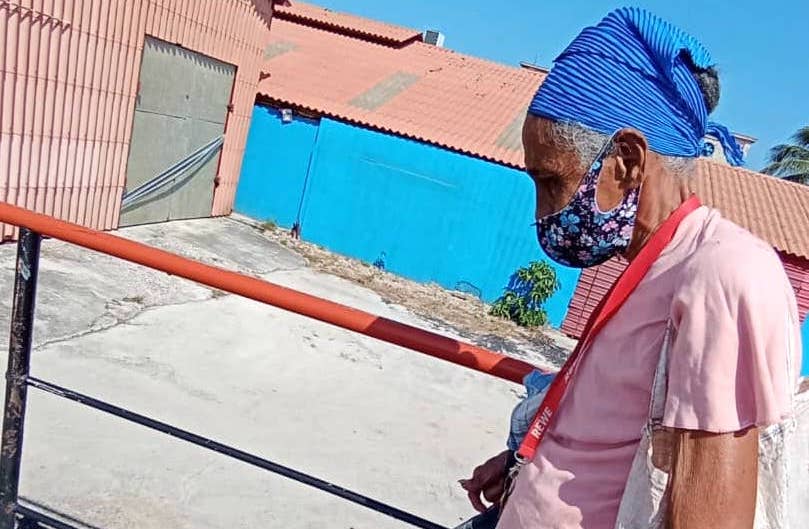It is 5:00 in the afternoon and, after almost eight hours in line to buy a package of chicken, two of picadillo, and a liter of oil, Amada Castellano Suarez regrets having grown old in Cuba. A 70-year-old retired elementary school teacher, receiving a check for barely 2,000 pesos a month, she languishes under awful conditions, struggling with health ailments in a country hit by a severe economic crisis that is affecting the national production of medicines.
"In addition to having to wait in line to buy food and personal hygiene products, I also have to wait in line at the pharmacy for days, but without knowing whether the medicines I need will even arrive. What kind of life can any human being have spending more than 16 hours a day in line, anxious about barely making ends meet, and the next day waking up to do it all over again?"
Castellano Suárez's story describes the daily lives of millions of senior citizens in a country where population aging is accelerating. Hers is not an isolated case, nor is it that the problems have simply worsened with the expansion of Covid-19 on the island. This is a scenario that has been taking shape for decades behind the regime’s euphemisms and the propaganda it sells to the world.
"Now they describe us as 'vulnerable,' to obscure the abandonment we Cubans suffer, especially the retired. I’m a teacher who worked for 35 years. I’m not helpless and I don't want to be condescended to. I need a decent retirement. A fair check in a fair country would be enough for me to live out my last days in peace," Castellano Suárez stated.
According to the National Office of Statistics and Information (ONEI), at the end of 2020 people over 60 years of age made up 21.3% of Cuba's population, double the number of citizens in that age range in 1970.
By the year 2050, people over 60 years of age are expected to make up 34.9% of the Cuban population. If this estimate is correct, Cuba will be the oldest country in Latin America.
On the Island, the retirement age, after 30 years of work, is set at 60 for women and 65 for men.
The plight of millions of retirees is not only due to their insufficient pensions, in view of the dollarization of the economy and the accelerated increase in the cost of living, which was not solved by the monetary unification; intra-family conflicts as a consequence of overcrowding, due to the housing deficit; the collapse of the Public Health system, and the always-precarious Social Assistance and Social Security system aggravate the hardships of the 60+ age group.
"In his right hand, an empty refrigerator, and in his left, hand a rope," is Gabriel Betancourt Morales' portrayal of himself, a 72-year-old retired lathe and milling machine operator from Cerro. The rope, alluding to suicide, conveys the tragic nature of his circumstances, which have him on the verge of opting to live in the street.
"It’s hard to accept that the only thing I get after working almost 40 years at a sugar mill is a check for 2,200 pesos. All Cubans know perfectly well how far that money goes today. Medicines on the black market are reserved for the wealthy, or those who receive family remittances from abroad. My health is getting worse, and I live with six other family members in just two rooms on a plot of land. I can barely pay for food because of the cost of my medicines. The mistreatment is not physical, but it hurts. I’m thinking of living on the street, buying my medicines and eating as much as I can with the rest of my money," says Betancourt Morales.
The total collapse of his house more than 20 years ago forced him to move with his family to a shelter. A little more than ten years ago they decided to illegally move into a room on a lot. For Betancourt Morales "growing old in this country is like a living hell."
"A circle of grandparents, hundreds of ads on television, and being labeled 'vulnerable' is not what we need. Those of us who have reached old age receive a check that was never even fair when we were working. I gave it for decades of my life. Being a retiree in Cuba means living hand to mouth," Betancourt Morales spat.
After the monetary and exchange rate reorganization process in Cuba, which came into effect in January 2021, the minimum salary and pension were set at 2,100 and 1,528 pesos per month, respectively.
"Emigrate and never go back, because growing old in Cuba isn?t an option," is the advice Gladys Ruiz Galán offers young Cubans. A 75-year-old retired nurse from Santo Suarez, she believes that the aging population on the island has exacerbated what is a kind of economic apartheid for retirees.
"When you reach old age your capacity to emigrate is practically nil, unless your children or grandchildren, if they live abroad, take care of you financially. Even receiving remittances is not enough to live comfortably, because it’s not only about prices, but also about the total scarcity of everything. So, imagine depending on nothing but a check for less than 2,500 pesos after having worked for 35 years. The only option you have left is to look for an extra job, your health allowing," said Ruiz Galán, who before the pandemic helped take care of other elderly people to cover her monthly expenses.
"I refuse to be a line holder, or a reseller, as a matter of personal dignity. I refuse to accept that as the end of growing old in my country after working my whole life: dedicating myself to activities into which the situation forces you, but which, at the same time, that the government you served denigrates and condemns. It's not fair to grow old in such predicaments. Being old in Cuba is just not fair."
